
|
"Paying your dues" is nearly universal, and most workers see upsides and downsides to the practice.
Earning the right to work, or "paying your dues," is common in many professions. For example, resident physicians often work 24-hour-plus shifts, even though medical guidelines suggest working such long hours is counterproductive. When experienced physicians are asked why these super-shifts remain in place, the answer is usually "because I had to when I was a resident."
The medical profession isn’t the only one where newbies earn their stripes under intense pressure. Jobs in finance and entertainment circles also have a reputation for making young employees go above and beyond to gain the respect of more seasoned workers. But what about other industries?
To gain some perspective on which industries make new workers earn their seat at the table, we surveyed 1,000 full-time employees for their insight and views. Follow us for the next few minutes to find out the results—and to see how our respondents feel about the practice.
Nine out of 10 survey takers reported having to pay dues at some point in their career. Putting in long hours and enduring excessive supervision, as described by 44% of people respectively, were the top two methods of gaining workplace respect. Let’s uncover a few others.
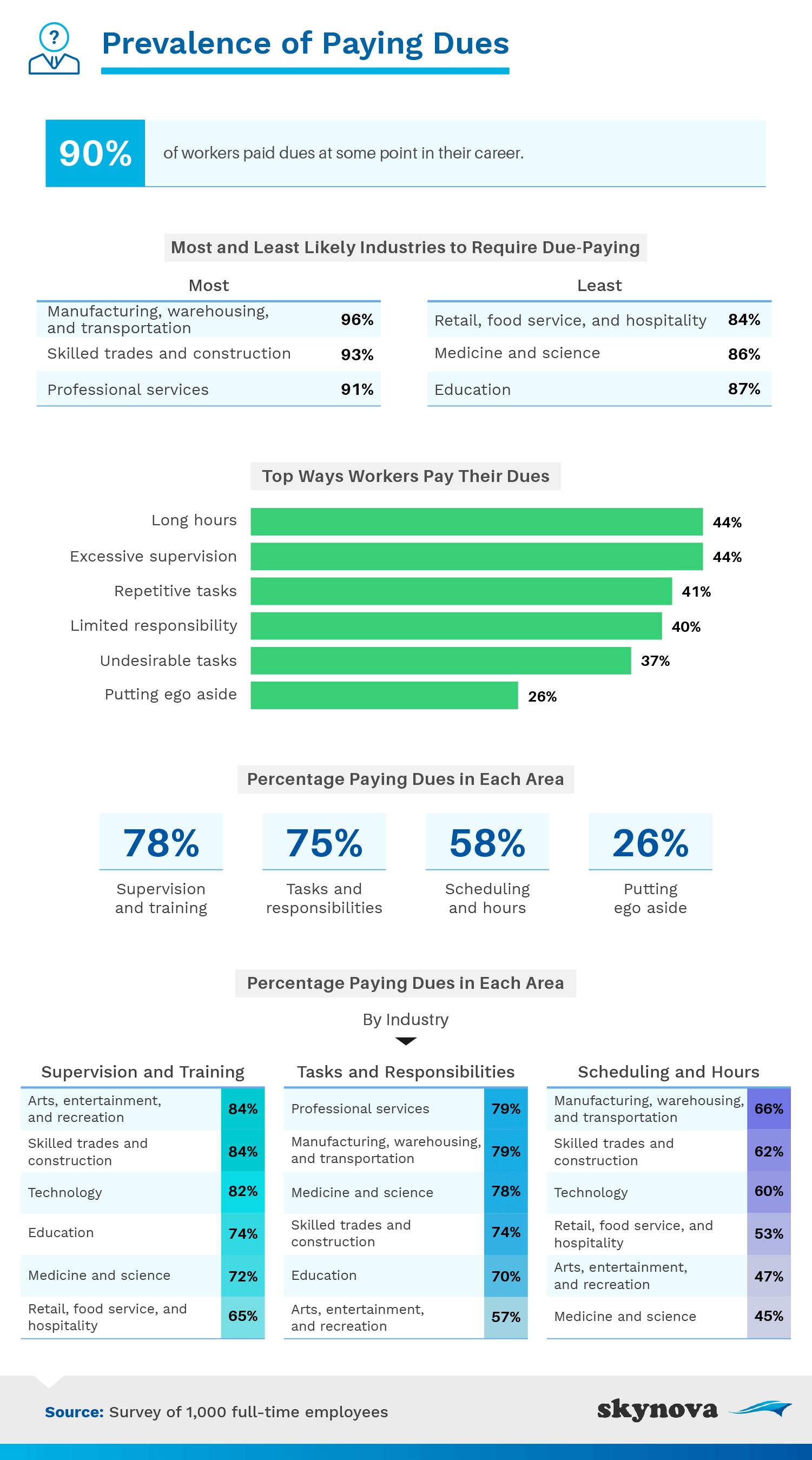
In addition to working long hours and accepting higher levels of scrutiny, the third most prevalent method of paying dues was accepting repetitive tasks, as experienced by 41% of our respondents. Conversely, 40% of respondents complained about being given too little responsibility.
While several white-collar professions are known for putting newbie employees through their paces, those working in blue-collar industries such as manufacturing, warehousing, and transportation also experienced stringent expectations when starting a new job or position. In fact, only 1 in 20 employees in these three industries could say they didn’t have to work to prove their worth when first starting out. Respondents in this sector were also the most likely to say they paid their dues through long scheduling and hours (66%).
Although the medical and scientific professions have a particular reputation for mandating excessive scheduling for newbies, only 45% of people in these fields indicated scheduling as an issue—21 percentage points less than respondents in the manufacturing, warehousing, and transportation industry.
Taking on undesirable duties and working extended hours are standard workplace initiation practices. But how long does this process last? A few weeks? Several months? Years, even? In addition to this, we wanted to know what people think of the other employees in their sector—do they also pay their fair share of dues?
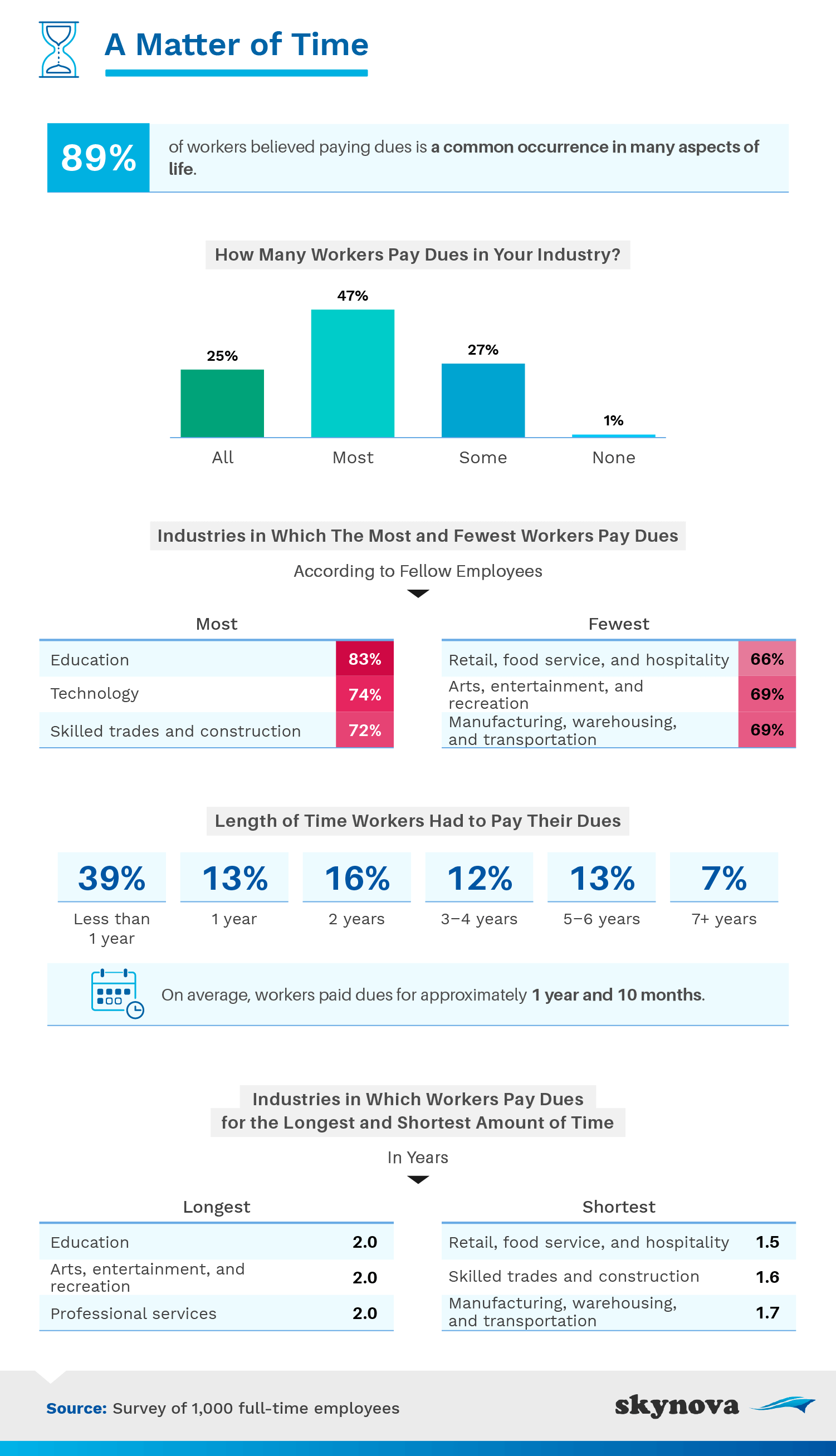
Overall, nearly three-quarters of employees believed all or most of the workers in their specific industry had to pay their dues—only 1% said that no one in their industry had to do so. However, of all the industries surveyed, respondents in the education sector believed the initiation process applied to the highest number of their colleagues.
Slightly over half of our respondents reported having to pay dues for a year or less. An astounding 48% said the practice can last from two to seven years. Overall, a year and 10 months was the average time it took to go from rookie to established employee.
Following on from this, we wanted to know which industries involved the longest unofficial probation period. According to our survey, those in the education sector once again topped the charts by noting that they paid job-related dues for two years. That’s also the same amount of time reported by those in the arts, entertainment, and recreation industries—as well as those in professional services.
Those in the retail, food service, and hospitality industries said a year and half was the average in their field. Skilled trades and construction and transportation and warehousing workers were expected to pay dues for just slightly longer.
Workplace trials aren’t just about physical labor or remedial tasks. Practically every survey respondent (98%) believed part of the due-paying experience involves learning and knowledge.
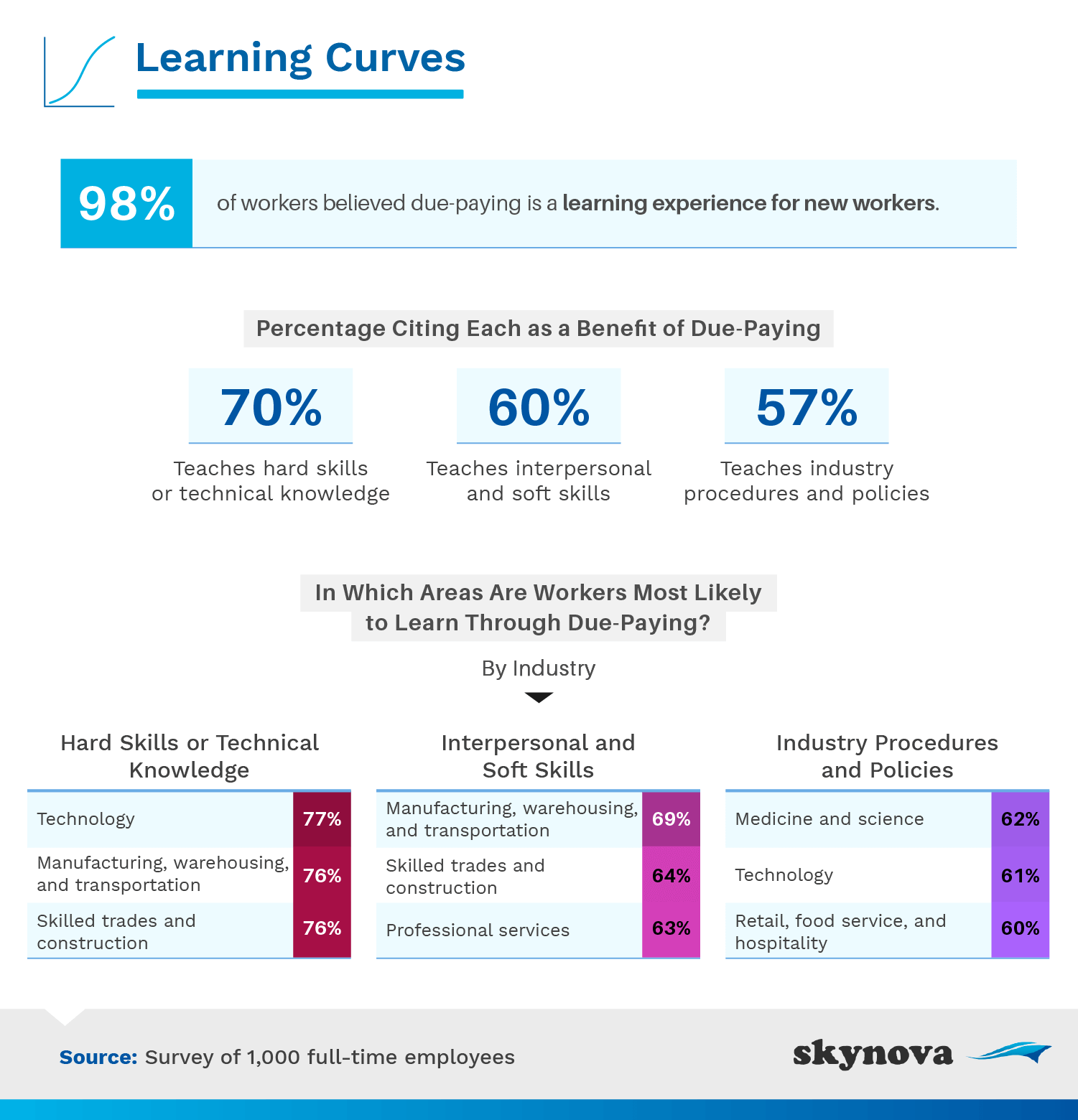
Exactly which skills are new workers learning while paying their industry dues?
Technical knowledge, which is essential in most positions, topped the list with 70% of respondents believing it to be a benefit of the due-paying learning curve. Six in 10 said soft or interpersonal skills were gained, while 57% believed industry-related policies and procedures were learned as a result of the new worker initiation process.
When we broke the results down by industry, those working in technology were most likely to say that due-paying taught hard skills or technical knowledge (77%). Meanwhile, manufacturing employees topped the list for learning interpersonal and soft skills (69%), while those in medicine and science were most likely to learn industry procedures and policies (62%) while earning their space in the workplace.
While some employees find the due-paying process a hassle, others feel that the experience builds stronger relationships and increased job knowledge.
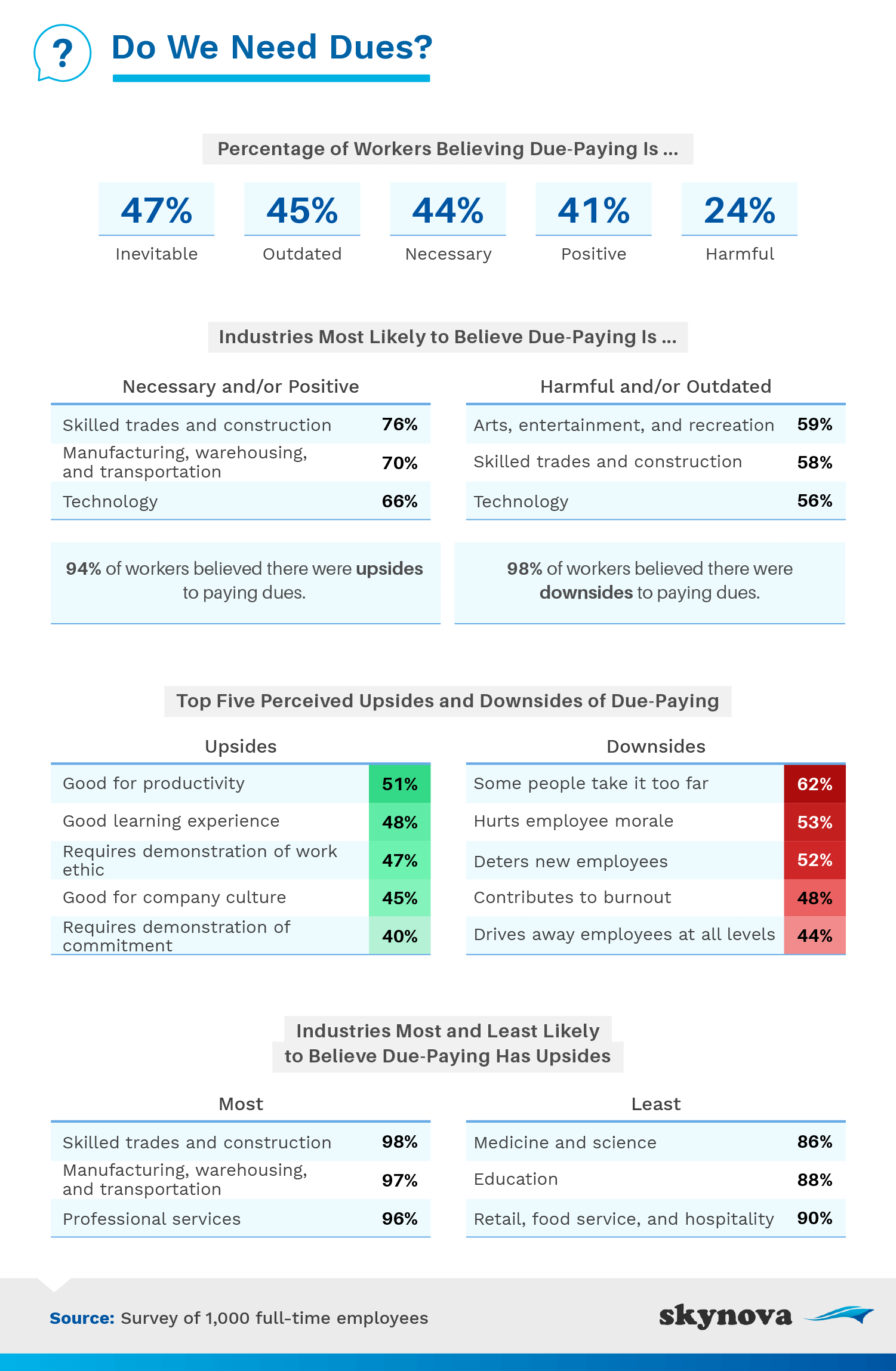
With every upside there’s always a downside, and paying workplace dues is no exception. That’s probably why 94% of respondents agreed paying dues comes with advantages; while at the same time, 98% recognized several downsides.
On the pro side, 44% saw due-paying as necessary, and 41% believed it was positive. Specific upsides mentioned were boosted productivity (51%), a valuable learning experience (48%), and the ability to demonstrate a good work ethic (47%). Meanwhile, just over 4 in 10 respondents maintained that due-paying was good for company culture and encouraging a high level of commitment. The industries that were most supportive of employees paying their dues were skilled trades and construction (98%) and manufacturing, warehousing, and transportation (97%).
On the other hand, 45% of respondents saw paying workplace dues as an outdated practice, while 24% went as far as saying it was harmful. Downsides included the fact that some employees can take workplace rites of passage too far (62%), the potential damage to employee morale (53%), and even the risk of deterring new employees from either staying in their job or applying in the first place (52%). Respondents in the food service and hospitality industry (90%) and education sector (88%) were the least likely to support due-paying traditions.
Building camaraderie between co-workers and managers is important in any job. As long as it’s acceptable and appropriate, workplace banter is often part of the process.
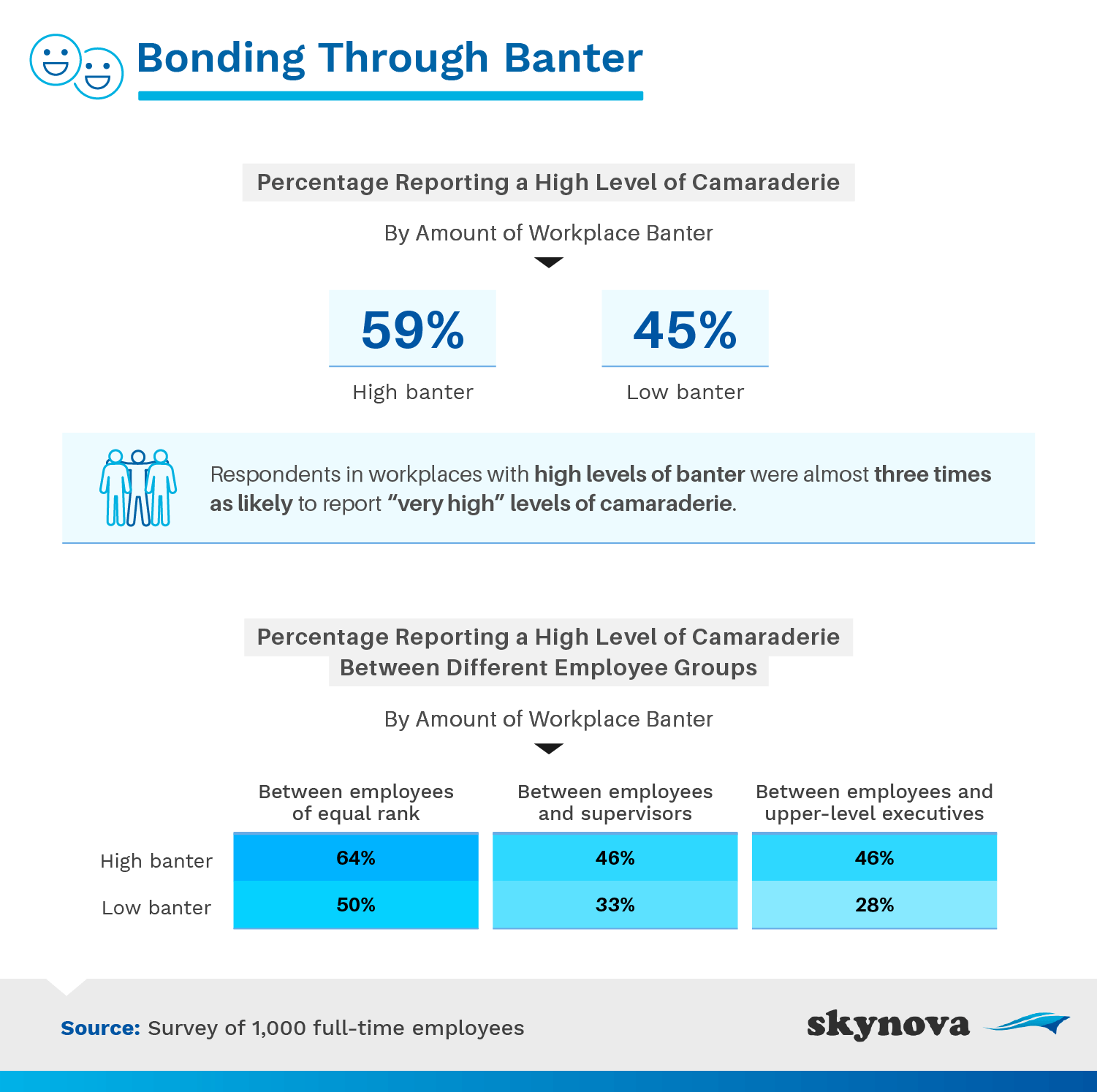
Sixty-four percent of respondents in workplaces with a high level of reported banter believed there was an equally high level of camaraderie between co-workers of equal rank. Forty-six percent in this category felt that banter had the same benefits for relationships between employees and supervisors, as well as employees and executive managers.
All of these percentages were greater than they were for respondents in workplaces with a low level of banter. In fact, respondents from workplaces with a high amount of banter were three times more likely to report "very high" levels of camaraderie at work.
The chances are good that most of us have a workplace dues-paying story to tell. Hopefully the process was a positive learning experience, potentially with some good-natured ribbing and maybe a prank or two. Wherever you are in your career, it’s important to consider the upsides and downsides of dues-paying and workplace rites of passage.
Skynova provides online software for small businesses, including invoices, accounting, time sheets, and more. In addition, we like to write in-depth articles about various topics we, and hopefully our customers, find interesting. These generally have a business or workplace angle, and often intersect with another area of society, e.g., business, technology, politics, sports, or health. The articles are based on surveys, statistics, and our own research.
For this analysis, we surveyed 1,000 full-time employees about their prior and current workplace experiences. Among our respondents, 609 respondents were men, 390 were women, and one identified as nonbinary. Our respondents ranged in age from 18 to 84 years old with an average age of 39.
In some cases, questions and answers have been rephrased or paraphrased for clarity or brevity. To help ensure accurate responses, survey respondents were required to correctly answer an attention check question.
These data rely on self-reporting. Potential issues with self-reported data include, but are not limited to, selective memory, attribution errors, and telescoping.
If you believe sharing these survey results will benefit your readers, please do but for noncommercial purposes only. The good news is we won’t ask you to work longer or empty every trash can in the building before going home. Simply link back to this article and credit our work, and you’re good to go.